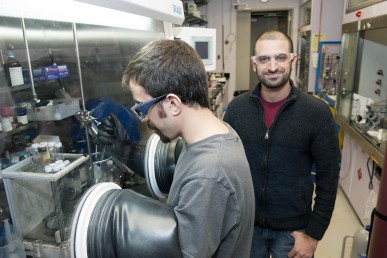Cheap metals can be used to make products from petroleum

Graduate student Thomas Mazzacano and Neal Mankad, assistant professor of chemistry. Photo: Roberta Dupuis-Devlin/UIC Photo Services (click on image for larger size)
The ancient alchemists sought to transform base metals, like lead, into precious gold. Now a new process developed at the University of Illinois at Chicago suggests that base metals may be worth more than their weight in gold — as catalysts in the manufacture of countless products made from petroleum-based raw materials.
The process is described online in the Journal of the American Chemical Society.
Pharmaceuticals, electronic components, plastics and fuels are just some of the goods based on petroleum, a hydrocarbon molecule. But to use petroleum, the chemical bonds between its hydrogen and carbon atoms must first be broken so that other elements can be added. Breaking those bonds — other than by burning — is a challenge to chemists.
“These carbon-hydrogen bonds are inert, and a catalyst is required to facilitate the chemical reactions that cause the bonds to break,” says Neal Mankad, UIC assistant professor of chemistry, who developed the process with his graduate student Thomas Mazzacano.
Most catalysts used currently are scarce and expensive “noble” metals, such as platinum, palladium and iridium. They are also toxic, and difficult to completely remove from pharmaceuticals and other products for human consumption.
“These metals are used for one reason — because they work really well, and there are few alternatives,” Mankad said. “Finding safer and cheaper substitutes for these noble-metal catalysts is a major goal of modern chemistry.”
Mankad has developed a way to use copper and iron together to replace the extremely rare metal catalyst iridium, which is used in a chemical process called borylation. Adding a boron atom to carbon is the first step in the synthesis of many products, from chemotherapy drugs to adhesives and polymers.
“Iridium is literally the least abundant element on the periodic table,” Mankad said. “In fact, much of it comes from meteorites.”
In the borylation reaction, iridium takes the two electrons that form the carbon-hydrogen bond and donates them to a boron atom to bind it to the carbon. In Mankad’s process, copper and iron each react with one electron, and together transfer the two electrons from a carbon-hydrogen bond to form the carbon-boron bond.
“Base metals were never considered for these two-electron reactions, like borylation,” Mankad said. “Copper and iron, which are pretty cheap and abundant, when placed very close together are able to take care of two-electron reactions, just like iridium.”
Mankad thinks his base-metal catalysis technique can be applied to other reactions that transform organic material into useful end products. His group is pursuing such applications and is working to make their strategy more practical, to compete with traditional noble-metal chemistry.
“Using copper and iron for catalyzing these reactions that are necessary for making so many of the things we rely on every day will benefit the environment and help bring costs down,” said Mankad. “Copper and iron are abundant and cheap — and don’t have to be so completely purified out of end products, unlike the noble metals, because they are less toxic.”
The research was supported by funding from the UIC Department of Chemistry and by a Pilot Research Grant from the UIC Campus Research Board.
